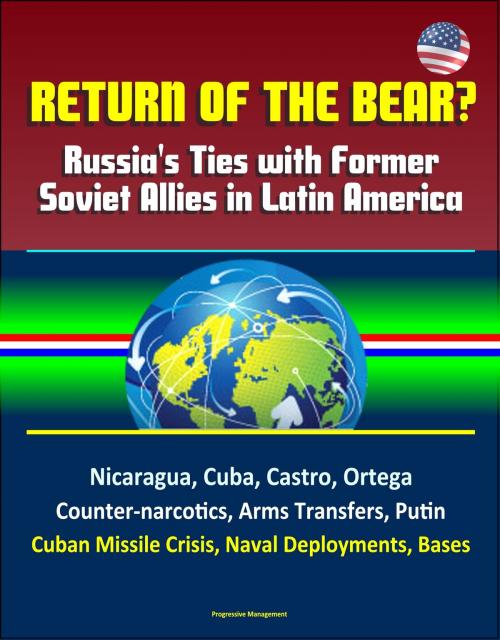Return of the Bear? Russia's Ties with Former Soviet Allies in Latin America: Nicaragua, Cuba, Castro, Ortega, Counter-narcotics, Arms Transfers, Putin, Cuban Missile Crisis, Naval Deployments, Bases
Nonfiction, History, Americas, Latin America, Asian, Russia| Author: | Progressive Management | ISBN: | 9781370029907 |
| Publisher: | Progressive Management | Publication: | October 22, 2016 |
| Imprint: | Smashwords Edition | Language: | English |
| Author: | Progressive Management |
| ISBN: | 9781370029907 |
| Publisher: | Progressive Management |
| Publication: | October 22, 2016 |
| Imprint: | Smashwords Edition |
| Language: | English |
This important report has been professionally converted for accurate flowing-text e-book format reproduction. Comparing Soviet ties with Cuba and Sandinista-led Nicaragua during the Cold War to Russian ties with Cuba and Nicaragua today, this study finds that Russia's reengagement with former Soviet allies in Latin America does not portend a return of the Soviet "bear" to the U.S. periphery. Daniel Ortega-led Nicaragua and the Castro regime in Cuba have indeed again become politically close with Russia and have each developed some security and economic ties with Russia since at least late 2008. Their mutual political support against Western positions at the UN and Russia's sporadic naval deployments and strategic bomber flights, as well as counter-narcotics cooperation with Nicaragua, may seemingly present a notable challenge to the United States in its periphery. Yet, Russia's ties—particularly security and economic ties—with the former Soviet allies remain rather narrow and do not present a significant challenge to the United States. As such, this thesis recommends that U.S. policymakers not adopt a "red scare" mentality about Russia's reengagement with its Cold War allies. Nonetheless, the United States should remain engaged with not only its partners in the region but also with Russian allies there to hinder further Russian engagement that may run counter to U.S. interests.
CHAPTER I - INTRODUCTION * A. MAJOR RESEARCH QUESTION * B. SIGNIFICANCE OF THE RESEARCH QUESTION * C. LITERATURE REVIEW * 1. Is the Soviet Bear Back? * 2. Geopolitical Positions: Challenging U.S. Supremacy * 3. Yet, Russia Not Getting Too Close * 4. Commercial Ties, Arms Sales, Energy as Important * 5. Limited Resources and Other Limitations * 6. Summary of Mixed Messages in Literature * D. HYPOTHESES * E. RESEARCH DESIGN * CHAPTER II - NICARAGUAN-RUSSIAN TIES * A. SOVIET-NICARAGUAN TIES IN THE COLD WAR * 1. The Revolution and the Superpowers * 2. The Soviet Bloc Helps the New Regime * a. Political Ties * b. Security Ties * c. Economic Ties * 3. The Soviet Union Curbs Its Support to the FSLN * B. CONTEMPORARY RUSSIAN-NICARAGUAN TIES * 1. Political Ties Resume under Ortega * a. Engagement for Economic Aid or to Counter U.S. Influence * b. Not Ideological Ties but Political Support * 2. Security Ties * a. Russia Unlikely to Have Bases in Nicaragua * b. Counter-Narcotics Cooperation * c. Military Equipment Modernization * 3. Economic Ties * a. Resumption of Aid * b. Increased but Tenuous Commerce * c. Comparatively Insignificant Economic Ties * C. CONCLUSION * CHAPTER III - CUBAN-RUSSIAN TIES * A. SOVIET-CUBAN TIES IN THE COLD WAR * 1. Cuba and the Superpowers after the Revolution * 2. Ties from the Missile Crisis until Gorbachev * a. Turbulent, Then Reconciled Political Ties * b. Security Ties * c. Economic Ties * 3. Ties under Gorbachev and the End of Soviet Support * B. CONTEMPORARY RUSSIAN-CUBAN TIES * 1. Political Ties * a. Relations through 2008 Limited by Resentment * b. Mutual Visits and Political Support Increase * 2. Security Ties * a. Limited Naval Deployments * b. Russia Unlikely to Have Bases in Cuba * c. Apparent Lack of Counter-Narcotics Cooperation * d. Some Military Equipment Refurbishment * 3. Economic Ties * a. Comparatively Insignificant Commerce, Limited Aid * b. Energy Projects sans Results * c. Debt Restructurings and Civilian Aircraft Deals * C. CONCLUSION * CHAPTER IV - CONCLUSION * A. ANALYSIS OF THE HYPOTHESES * B. IMPLICATIONS FOR U.S. POLICY * LIST OF REFERENCES
This important report has been professionally converted for accurate flowing-text e-book format reproduction. Comparing Soviet ties with Cuba and Sandinista-led Nicaragua during the Cold War to Russian ties with Cuba and Nicaragua today, this study finds that Russia's reengagement with former Soviet allies in Latin America does not portend a return of the Soviet "bear" to the U.S. periphery. Daniel Ortega-led Nicaragua and the Castro regime in Cuba have indeed again become politically close with Russia and have each developed some security and economic ties with Russia since at least late 2008. Their mutual political support against Western positions at the UN and Russia's sporadic naval deployments and strategic bomber flights, as well as counter-narcotics cooperation with Nicaragua, may seemingly present a notable challenge to the United States in its periphery. Yet, Russia's ties—particularly security and economic ties—with the former Soviet allies remain rather narrow and do not present a significant challenge to the United States. As such, this thesis recommends that U.S. policymakers not adopt a "red scare" mentality about Russia's reengagement with its Cold War allies. Nonetheless, the United States should remain engaged with not only its partners in the region but also with Russian allies there to hinder further Russian engagement that may run counter to U.S. interests.
CHAPTER I - INTRODUCTION * A. MAJOR RESEARCH QUESTION * B. SIGNIFICANCE OF THE RESEARCH QUESTION * C. LITERATURE REVIEW * 1. Is the Soviet Bear Back? * 2. Geopolitical Positions: Challenging U.S. Supremacy * 3. Yet, Russia Not Getting Too Close * 4. Commercial Ties, Arms Sales, Energy as Important * 5. Limited Resources and Other Limitations * 6. Summary of Mixed Messages in Literature * D. HYPOTHESES * E. RESEARCH DESIGN * CHAPTER II - NICARAGUAN-RUSSIAN TIES * A. SOVIET-NICARAGUAN TIES IN THE COLD WAR * 1. The Revolution and the Superpowers * 2. The Soviet Bloc Helps the New Regime * a. Political Ties * b. Security Ties * c. Economic Ties * 3. The Soviet Union Curbs Its Support to the FSLN * B. CONTEMPORARY RUSSIAN-NICARAGUAN TIES * 1. Political Ties Resume under Ortega * a. Engagement for Economic Aid or to Counter U.S. Influence * b. Not Ideological Ties but Political Support * 2. Security Ties * a. Russia Unlikely to Have Bases in Nicaragua * b. Counter-Narcotics Cooperation * c. Military Equipment Modernization * 3. Economic Ties * a. Resumption of Aid * b. Increased but Tenuous Commerce * c. Comparatively Insignificant Economic Ties * C. CONCLUSION * CHAPTER III - CUBAN-RUSSIAN TIES * A. SOVIET-CUBAN TIES IN THE COLD WAR * 1. Cuba and the Superpowers after the Revolution * 2. Ties from the Missile Crisis until Gorbachev * a. Turbulent, Then Reconciled Political Ties * b. Security Ties * c. Economic Ties * 3. Ties under Gorbachev and the End of Soviet Support * B. CONTEMPORARY RUSSIAN-CUBAN TIES * 1. Political Ties * a. Relations through 2008 Limited by Resentment * b. Mutual Visits and Political Support Increase * 2. Security Ties * a. Limited Naval Deployments * b. Russia Unlikely to Have Bases in Cuba * c. Apparent Lack of Counter-Narcotics Cooperation * d. Some Military Equipment Refurbishment * 3. Economic Ties * a. Comparatively Insignificant Commerce, Limited Aid * b. Energy Projects sans Results * c. Debt Restructurings and Civilian Aircraft Deals * C. CONCLUSION * CHAPTER IV - CONCLUSION * A. ANALYSIS OF THE HYPOTHESES * B. IMPLICATIONS FOR U.S. POLICY * LIST OF REFERENCES















